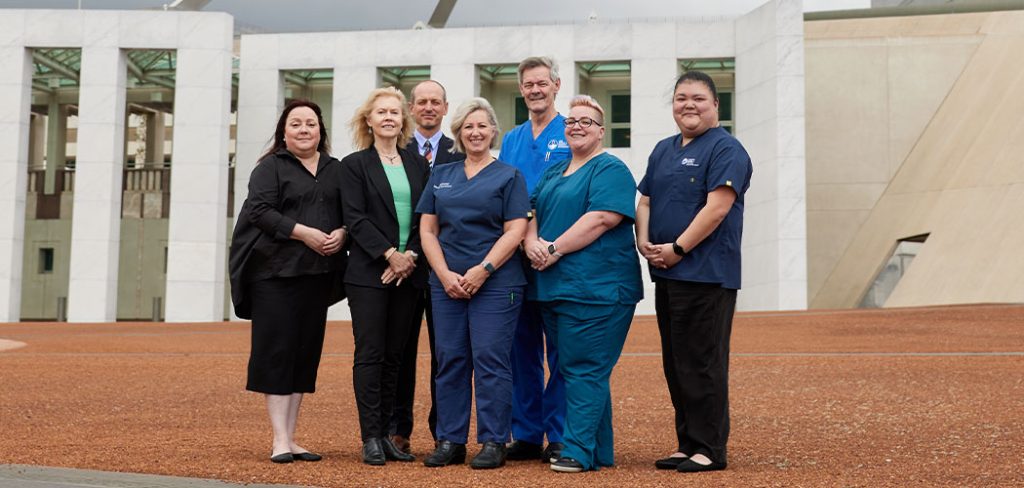In the early days of her career, Juliane Samara often heard people suggest that nurses shouldn’t engage in politics.
She never shared the view and, over the past two decades, has regularly spoken up to help achieve meaningful change for her profession, including improvements in working conditions, staffing levels, and fair pay rises.
“My motivation is to get the best outcomes for nurses and nations nationally,” she tells the ANMJ.
“Nurses have always been strong advocates for their patients and their community. And you can be an advocate all you like, but unless you raise your voice to secure systemic change in the health system, you can’t actually deliver good patient care and achieve the outcomes needed.”
A Palliative Care Nurse Practitioner with expertise in aged care and oncology, Juliane recently moved from her hometown of Canberra to NSW, taking on a role providing outreach in nursing homes and the community, particularly aimed at preventing unnecessary hospitalisations.
While she hasn’t held any formal positions with the Australian Nursing and Midwifery Federation (ACT Branch), her active involvement as a union member speaks volumes. She’s helped fight for various issues, including enterprise bargaining claims related to the role of nurse practitioners, securing non-clinical/research time, and ensuring working conditions align with professional practice standards.
During the past year, she supported the ANMF (ACT Branch) in navigating the government’s recent acquisition of Calvary Public Hospital, including Clare Holland House, an inpatient and community palliative care service, where Juliane worked for many years. Initially, the government proposed to split the services, taking inpatients across to Canberra Health Service, and leaving community services standalone.
“I felt really strongly that that wouldn’t work and that it would adversely affect both patients and staff,” reflects Juliane.
“I felt that we needed to be a cohesive service with access to a public hospital and all of the health professionals and services that are required for patient care. I stood up and was vocal with the executive and the union and had several meetings with the Minister to really put our case for keeping the service together as a whole, which I’m pretty proud to say, was successful.”
Juliane firmly believes that nurses must stay informed and engaged in all matters shaping healthcare policies and legislation, including planning and staffing, which ultimately impact patient care.
At the national level, her lobbying efforts as a representative of the ANMF have helped secure landmark reforms in aged care, including RN 24/7 coverage, mandated minimum staffing ratios, and removing collaborative arrangements preventing nurse practitioners from working to their full scope of practice.
“Aged care is the big one,” she says.
“The union (ANMF) really stood up for aged care when nobody else wanted to. It wasn’t on the radar from a health perspective until the Royal Commission. The union has consistently fought for the rights of older people living in aged care, and also for the workforce looking after those people to have good conditions.”
Underscoring her commitment to nursing and the rights of patients, last year, Juliane was the sole nurse and only clinician appointed to the federal government’s Aged Care Taskforce, chaired by Aged Care Minister Anika Wells, which was charged with reviewing funding arrangements for aged care and developing sustainable options for a system that is fair and equitable now and into the future.
Despite initial trepidation, Juliane says she felt a “heavy sense of responsibility” to contribute meaningfully to the high-level advisory group and seized the opportunity to help shape the future landscape for aged care.
“I was really able to speak up in terms of care, the nursing workforce, and the aged care workforce,” explains Juliane.

“So, if I didn’t do anything else, being able to raise my voice and say what I needed to say to get a couple of things changed in the principles and the recommendations to ensure the needs of older people remained the focus; I’ll take that as an achievement.”
Reflecting on her experiences, Juliane says to drive change, nurses and midwives must get political.
“The starting point would be to join the union and turn up to the members meetings,” she says.
“That’s a good way to get a feel for what unions do and the kind of issues that they address. “The other thing is to take a look at the issues in your own workplace and start thinking about what needs to be fixed and how that might be approached. There are things, for example, in my job as a nurse practitioner, that I could go directly to government for in terms of legislative change around prescribing. But if I go to my union and say, ‘here’s an issue that’s affecting the workforce, can you help us with this?’ then that’s a really good way to get a more powerful voice.”








